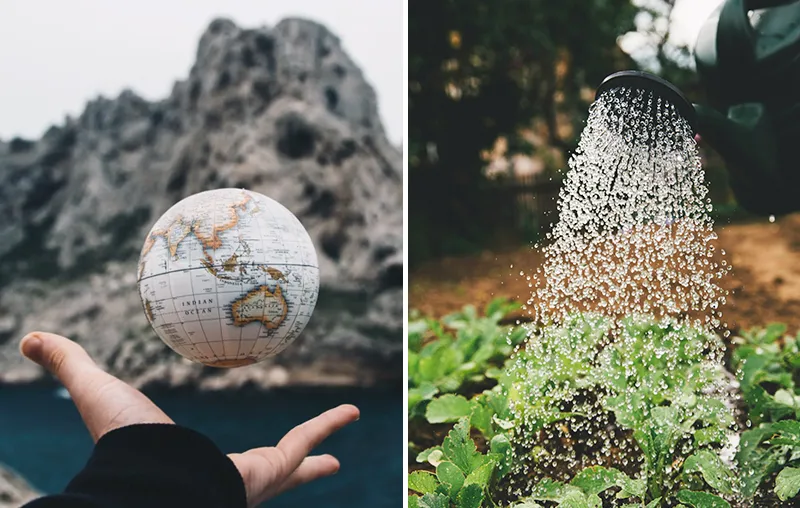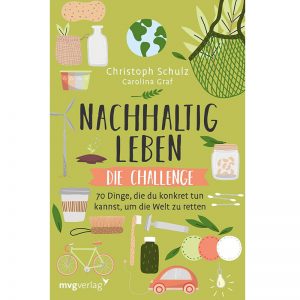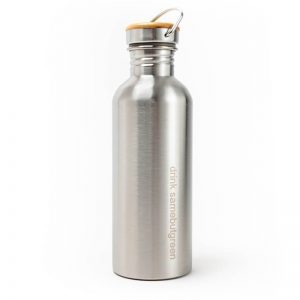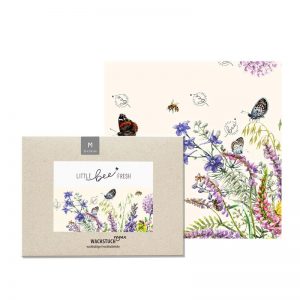How can we conserve natural resources in everyday life? Wenn du eine klare Antwort auf diese Frage suchst, bist du hier genau richtig! Vor massiven, ökologischen Herausforderungen stehen wir Menschen auch, weil uns viele natural resources des Planeten, zum Beispiel Erdöl, Kohle, Erdgas, Eisenerz und Sand, nicht in unendlichen Mengen zur Verfügung stehen.
Dennoch verbrauchen wir mehr Ressourcen, als unser Planet verkraften kann. Der jährliche Earth Overload Day rückt immer näher an den Jahresanfang. Wir rauben die Erde aus, zerstören die Lebensgrundlage anderer Lebewesen und bedrohen schlussendlich auch unsere eigene Existenz. Doch glücklicherweise lässt sich mit einfachen Mitteln etwas dagegen unternehmen!
In diesem Artikel möchte ich dir jetzt einige Tipps an die Hand geben, um jeden Tag ganz bewusst Ressourcen zu schonen, ohne dich persönlich einzuschränken. Auf geht's!
Motive: Warum sollte man natürliche Ressourcen im Alltag schonen?

Wir Menschen sind Teil der Natur. Wir beeinflussen sie durch unser Handeln, doch sind auch von ihr abhängig. Indem wir unsere Umwelt zerstören, sägen wir also sprichwörtlich weiter an dem Ast, auf dem wir sitzen. Anstatt weiter ein Teil des Problems sein, sollten wir uns lieber so schnell wie möglich dessen Lösung widmen.
Hier möchte ich dir vorher noch einmal kurz the most motivating advantages of a resource-friendly lifestyle that you can use as constant drivers:
- Limitierte Ressourcen der Erde für zukünftige Generationen bewahren: Wer die Natur schützt, schützt sie auch für die eigenen Kinder und Enkelkinder. Man sorgt durch einen ressourcenschonenden Alltag für die langfristige Erholung und die Verfügbarkeit begrenzter Rohstoffe – wodurch schlussendlich auch die Kosten für Energie und Material dauerhaft bezahlbar bleiben.
- Umwelt und Gesundheit schützen: Resource-conscious action reduces your own carbon footprint, ecological footprintslows down the climate change aus und reduziert den Müll in der Natur. Außerdem schützt man auf diese Weise lebensnotwendige Ressourcen, wie beispielsweise reines Trinkwasser, fruchtbare Böden und saubere Luft.
- Ökosysteme schonen: Conserving resources reduces the exploitation of the planet. Accordingly, you also make a valuable contribution to protecting the environment. stop global species extinction, the Biodiversity zu erhalten und Tiere zu schützen.
- Driving forward sustainable development: Indem du Ressourcen im Alltag schonst, förderst du das Environmental awareness und die nachhaltige Lebensweise unserer Gesellschaft. So bist du ein Vorbild mit spürbarem, positivem Impact.
- Preventing social conflicts and wars: Der Kampf um natürliche Ressourcen wie Trinkwasser, Land und Rohstoffe spitzt sich mit zunehmender Knappheit zu. Ressourcenbewusstes Handeln mindert also beispielsweise auch die Kriegsgefahr. Außerdem wirkt es sozialen Herausforderungen, wie dem World hunger, against.
Fallen dir weitere Vorteile und Gründe ein? Then write a comment under this article.
10 tips: How can you live more resource-friendly?
Es ist ein kaum vorstellbares Szenario, dass plötzlich kein Wasser mehr aus dem Hahn kommt. Doch die Drinking water shortage bestimmt bereits heute den Alltag unzähliger Menschen. Whether water, electricity, wood or gas – wir alle sollten uns also bewusst machen, dass die meisten Ressourcen nicht unbegrenzt zur Verfügung stehen und dass wir schonend und respektvoll mit ihnen umgehen müssen.
As promised, I will now introduce you to wertvolle Tipps zum Schutz natürlicher Ressourcen before. Simply integrate them into your everyday life bit by bit.
1. reduce consumption of animal foods

Unsere Gier nach Fleisch sorgt für Tierleid in der Factory farming – doch auch Water shortage and the Deforestation of the rainforests für die Schaffung von Ackerflächen zum Feed cultivation and Weideflächen zählen zu den Folgen.
Um eine tierische Kalorie zu erzeugen, müssen durchschnittlich sieben pflanzliche Kalorien verbraucht werden.1 Für ein Kilogramm Rindfleisch werden mehr als 15.000 Liter Wasser und 49 Quadratmeter Fläche benötigt – und etwa 27 Kilogramm CO2-Äquivalente ausgestoßen.2
Who the "Detour animal" avoids und sich rein pflanzlich ernährt, kann also täglich Unmengen natürlicher Ressourcen schonen. Für einen leichten Umstieg kann ich dir wärmstens den Online course "Going vegan made easy "* and my book „Kochen fürs Klima“* to the heart.
Weiterführende Beiträge im Blog:
2. save energy
Ob wir unser Smartphone aufladen, im Internet surfen oder mit dem Auto zur Arbeit fahren – wir alle verbrauchen täglich Energie. Doch solange diese nicht aus unendlichen, erneuerbaren Ressourcen stammt, fallen wir unserem Planeten enorm zur Last. Deshalb ist es ratsam, auf grünen Strom umzusteigen. Wenn du magst, kommst du hier direkt zum Ökostrom-Vergleich* – der Wechsel dauert auch nur 5 Minuten.
Unabhängig von der Energiequelle lohnt es sich außerdem immer, die verfügbare Energie bewusst zu nutzen. Du kannst sie zum Beispiel sparen, indem du warme Mahlzeiten außerhalb des Kühlschranks abkühlen lässt, bevor du sie hineinstellst. Weitere Energy saving tips are, for example, the use of Motion detectors und das regelmäßige Abtauen des Kühlschranks.
3. save water
We consume water as a resource in our everyday lives both directly and indirectly. In direct form, when we Drink from the tap oder den Garten bewässern. Und indirekt, indem wir Lebensmittel konsumieren, die in trockenen Ländern aufwendig mit dem knappen Gut beregnet werden.
In everyday life, for example, you can Save waterby Regenwasser auffängst, um deinen Pflanzen damit zu gießen. Oder indem du bevorzugt Leitungswasser trinkst und deine Lebensmittel ganz bewusst regional and seasonal shop. All das wirkt sich positiv auf deinen persönlichen Water footprint off.
Tip: Have a look at my Drinking bottle comparison an. Meine persönliche Empfehlung, um in Plastikflaschen abgepacktes Mineralwasser einfach zu vermeiden, ist diese Glasflasche mit Bügelverschluss von Soulbottles*.
4. value clothing
The Fast Fashion Industry has ensured that nowadays new trends and seasons are proclaimed almost every week. But every piece of clothing has a story. Die Baumwolle muss schnell angebaut werden. Das geht nur unter Gifteinsatz – der vielen Bäuerinnen und Bauern das Leben kostet.
Kleidung muss außerdem genäht werden – und wenn ein T-Shirt nur 5 Euro kostet, dann musste zwangsläufig irgendwer dafür draufzahlen. Die Natur, deren Gewässer schon die Trendfarbe der neuen Saison trägt. Aber auch andere Menschen, die es für einen Billiglohn in dunklen, staubigen Hallen zusammennähen mussten. Das bestätigt eindrucksvoll auch die Dokumentation „The True Cost – Der Preis der Mode“*, die auch dir garantiert die Augen öffnen wird.
So learn to use your vorhandene Kleidung wertzuschätzen and bevorzuge möglichst Second-Hand-Mode. Versuche dir auch vermehrt Kleidungsstücke zu besorgen, die nachhaltig und gut miteinander kombinierbar sind. So schonst du schlussendlich natürliche Ressourcen, schaffst mehr Platz im Kleiderschrank, sparst viel Geld und hast trotzdem eine große Auswahl.
Weiterführende Beiträge im Blog:
- Slow Fashion – Was versteht man darunter?
- Ist es noch zeitgemäß, Pelz zu tragen?
- Making clothing more durable
- Nachhaltige Mode erkennen – So geht's!
5. save paper
Papier wächst nicht an den Bäumen – aber es wird aus ihnen gemacht. Für jedes Blatt oder Papierprodukt musste irgendwo auf der Welt ein Baum fallen. Be aware of this and avoid paper wherever possible. So kannst du die natürliche Ressource im Alltag definitiv schonen.
Gut funktioniert das natürlich auch durch den Einsatz digitaler Produkte. Mit einem such e-reader* you can Bücher zum Beispiel digital lesen and save paper. And with Online maps auf dem Smartphone sparst du dir den dicken Stadtführer aus Papier.
Weiterführende Beiträge im Blog:
- Save paper in the office
- Deforestation
- Folding garbage bags from newspaper
- Papier oder Plastik – Was ist umweltfreundlicher?
6. avoid food waste
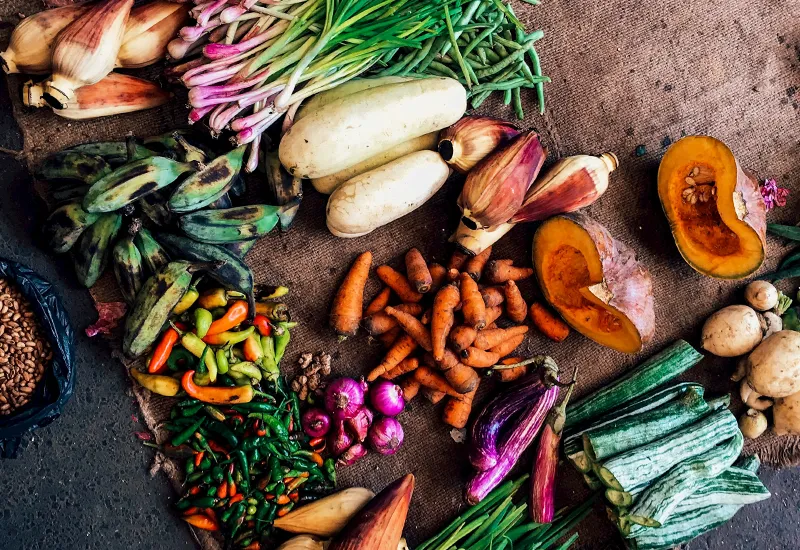
Etwa 78 Kilogramm noch genießbarer Lebensmittel werfen wir Deutschen durchschnittlich pro Jahr in die Mülltonne.3 Viele Tiere mussten dafür (völlig umsonst) leiden – und viele Pflanzen aufwendig bewässert werden. Das ist kein respektvoller Umgang – weder mit fühlenden Lebewesen, noch mit den eingesetzten, natürlichen Ressourcen.
Therefore, buy your food carefully and Reduce your food waste. Plan your meals der nächsten Woche am besten schon vor deinen Einkäufen und Stick to your shopping list, um keine überflüssigen Dinge einzukaufen. Mit diesen Tipps wird es dir wesentlich leichter fallen, im Alltag Ressourcen zu schonen.
Weiterführende Artikel im Blog:
- Making food last longer
- Freeze food without plastic
- Food Sharing - What is it?
- Making good use of leftover food
7. think minimalist
Damit du nicht alten Gewohnheiten verfällst und im Laufe der Zeit wieder mehr Ressourcen verschwendest, ist eine persönliche Grundeinstellung von Vorteil, die dein Handeln focused on the really necessary things.
Consume and buy only those things that also have a echten Mehrwert für dich darstellen. Das klingt logisch, ich weiß. Aber oft lassen wir uns von blinkenden Werbebannern oder aufdringlichen Verkäufer:innen umstimmen. Wenn du bewusst minimalistisch denkst, kann dir dein Mindset sustainably save a lot of money.
The book "The Minimalism Project" by Christof Hermann* hat mir persönlich übrigens enorm dabei geholfen und ist meine absolute recommendation to you.
Weiterführende Artikel im Blog:
- Minimalistisch leben – So einfach geht's!
- The best minimalism apps
- Psychology of minimalism
- Inspirational minimalism quotes
8. conscious use of technology
Around 68 million people in Germany have a smartphone4 – und viele von ihnen besitzen sogar mehrere! Vor allem, weil ständig neue Modelle herauskommen und viele von uns sie es direkt am Erscheinungstag in den Händen halten wollen.
Unfortunately, this Consumerism der Respekt gegenüber den Menschen auf der Strecke, die die dafür notwendigen rare metals (z.B. Gold, Kobalt und Coltan im Kongo) aus den Minen holen. Aber auch der Respekt gegenüber der Natur fehlt, die uns diese begrenzten Ressourcen ja zur Verfügung stellt.
Um diesbezüglich Ressourcen in deinem Alltag zu schonen, solltest du dein So it's better to have your cell phone repaired und möglichst lange benutzen, anstatt ständig ein neues zu kaufen. Auch die Bevorzugung von Geräten, die refurbished (also sozusagen generelüberholt und geprüft) sind, ist eine ressourcenschonende Maßnahme.
Weiterführende Beiträge im Blog:
- Nachhaltige telefonieren – So geht's!
- What are the disadvantages of smartphones?
- Gebrauchtes Smartphone kaufen – Darauf solltest du achten!
9. be sustainable on the road
About 45 million diesel and gasoline engines beanspruchen bereits die deutschen Straßen.5 Dabei stoßen die Autos durchschnittlich 226 grams of greenhouse gases pro gefahrenen Kilometer aus.6
Meiner Beobachtung nach bewegen wir uns zu wenig selbst – und schwingen uns sogar für kurze Strecken zum Bäcker schnell auf den Fahrersitz. Eine More conscious use of the car (und natürlich auch des Flugzeugs!) und ein sparsamer Umgang mit den natürlichen Ressourcen, die es verbraucht, ist definitiv angebracht. Sowohl, um protect the environment in everyday lifeas well as to stay healthy.
Gehe stattdessen mehr zu Fuß, fahre mit dem Fahrrad und nutze die öffentlichen Verkehrsmittel sowie die Bahn, um das Avoid driving and flying as much as possible.
Weiterführende Beiträge im Blog:
- Autofrei leben – So geht's
- Nachhaltig Auto fahren – Die besten Tipps
- Offsetting CO2
- Nachhaltig fliegen – So klappt es
10. avoid garbage
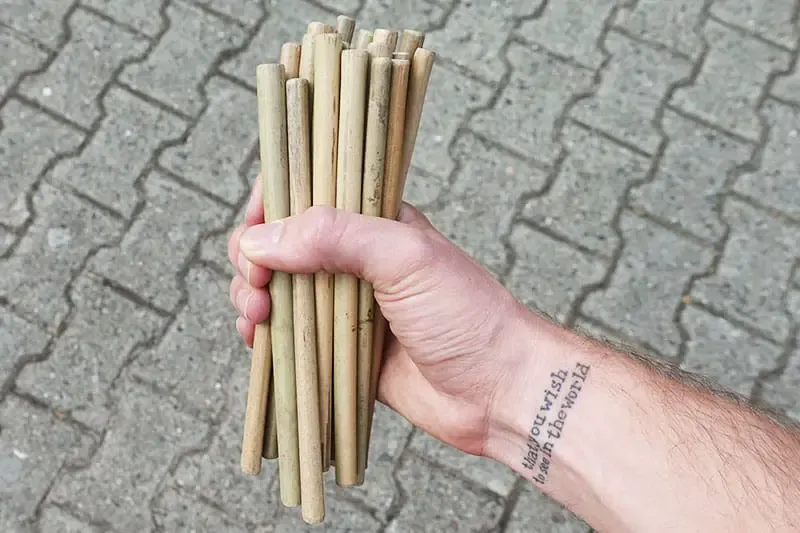
Many products and especially viele Produktverpackungen sind überflüssig. For this reason, the Zero Waste Lifestyle entstanden. Menschen versuchen dabei ganz gezielt, Müll zu vermeiden.
With this in mind, you can unzählige Wegwerf-Produkte durch wiederverwendbare Alternativen ersetzen. Swap plastic straws for washable ones, for example Glass straws*, Bamboo* or Stainless steel* – und die Plastik- und Papiertüten für Obst- und Gemüse im Supermarkt gegen wiederverwendbare Gemüsenetze* made of cotton.
Weiterführende Beiträge im Blog:
Natürliche Ressourcen schonen im Alltag – das ist einfach!
Verschwendung und Raub sind respektlos – und zwar gegenüber der Natur, gegenüber Tieren und gegenüber anderen Menschen. Es ist unglaublich wichtig, alle Ressourcen, die dieser Planet zur Verfügung stellt, wertzuschätzen und so zu behandeln, dass sie auch zukünftigen Generationen zur Verfügung stehen.
I very much hope that this article will be of great help to you. Integriere die Tipps einfach nach und nach in dein alltägliches Lebento make a real difference.
"We deal with this world as if we had a second one in the trunk."
Jane Fonda (more at Environmental protection quotes)
Hast du Fragen, Tipps oder eigene Erfahrungen mit dem ressourcenschonenden Leben, die du teilen möchtest? Dann schreib mir einfach einen Kommentar.
Stay environmentally friendly,

PS: In my Environmental protection blog erfährst du noch viel mehr über einen nachhaltigen Alltag. Erfahre als Nächstes zum Beispiel, wie du dir einen create a bird friendly garden and enjoy the chirping of birds every day.
References:
- S. Weick; Brot für die Welt; Evangelisches Werk für Diakonie und Entwicklung e.V. (2010): Fleischkonsum (Stand: März 2010). https://www.brot-fuer-die-welt.de/fileadmin/mediapool/2_Downloads/NIFSA/NIFSA_Kampagnenblatt_Fleischkonsum.pdf. [27.02.2024]. ↩︎
- Bund für Umwelt und Naturschutz Deutschland e. V.: Ressourcen schützen und respektvoll nutzen! (Stand: Februar 2014), abrufbar unter https://t1p.de/7bsy. [27.02.2024]. ↩︎
- Umweltbundesamt: Lebensmittelabfälle (Stand: 31.05.2023), abrufbar unter https://www.umweltbundesamt.de/themen/abfall-ressourcen/abfallwirtschaft/abfallvermeidung/lebensmittelabfaelle. [27.02.2024]. ↩︎
- Statista; VuMA; Bitkom Research; comScore: Number of smartphone users in Germany in the years 2009 to 2022 and forecast to 2027 (as of July 2023), available at https://de.statista.com/statistik/daten/studie/198959/umfrage/anzahl-der-smartphonenutzer-in-deutschland-seit-2010. [27.02.2024]. ↩︎
- Kraftfahrt-Bundesamt (KBA): Anzahl der Personenkraftwagen in Deutschland nach Kraftstoffarten von 2017 bis 2023 (Stand: März 2023), abrufbar unter https://de.statista.com/statistik/daten/studie/4270/umfrage/pkw-bestand-in-deutschland-nach-kraftstoffarten. [27.02.2024]. ↩︎
- Federal Environment Agency: Safer and more environmentally friendly travel by bus and train (as of 19.07.2023), available at https://www.umweltbundesamt.de/umwelttipps-fuer-den-alltag/mobilitaet/bus-bahn-fahren. [27.02.2024]. ↩︎

